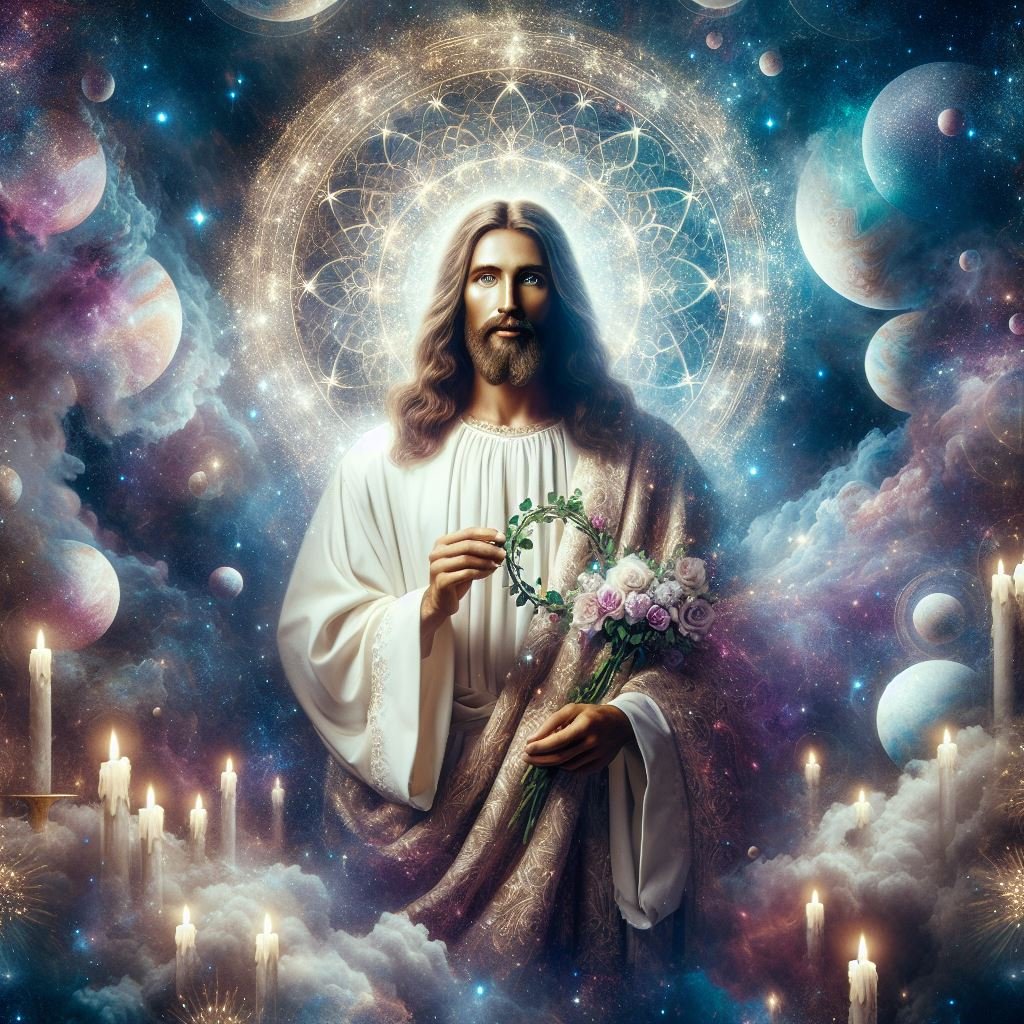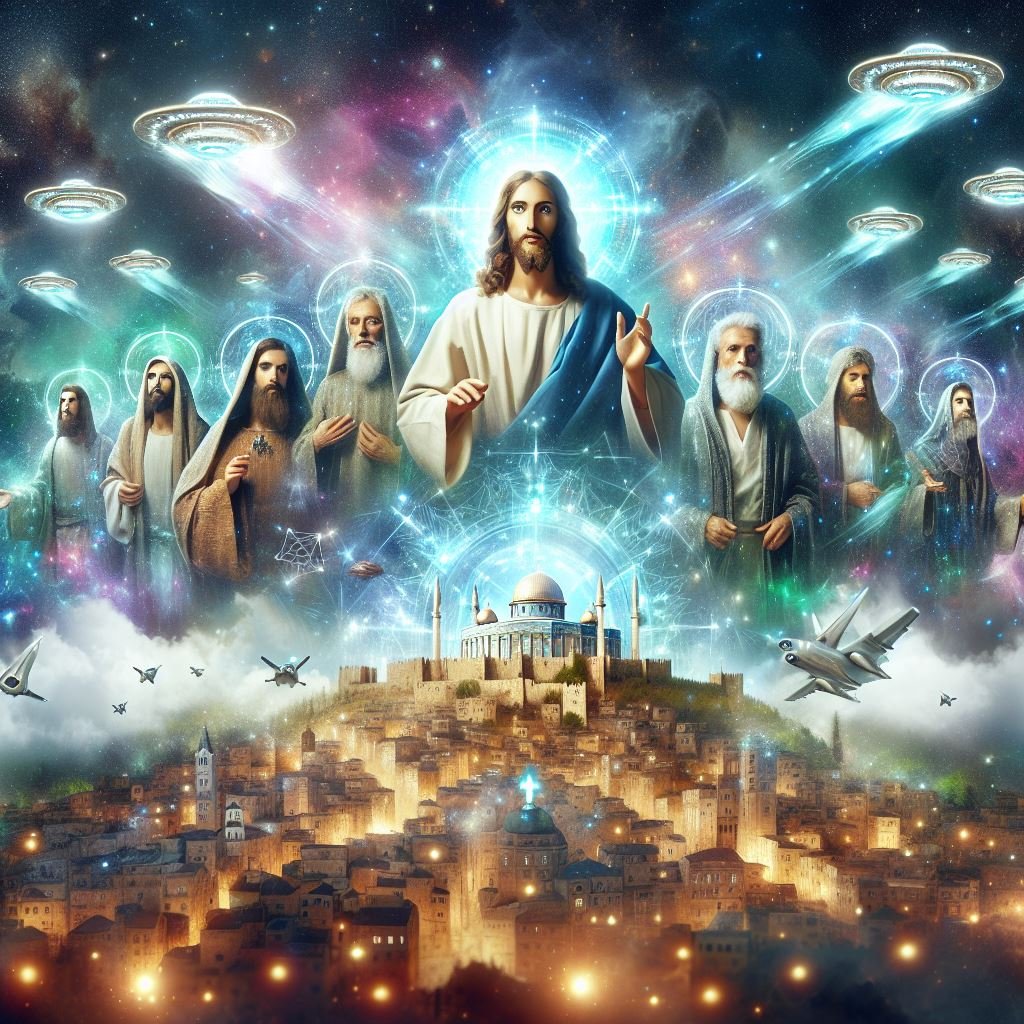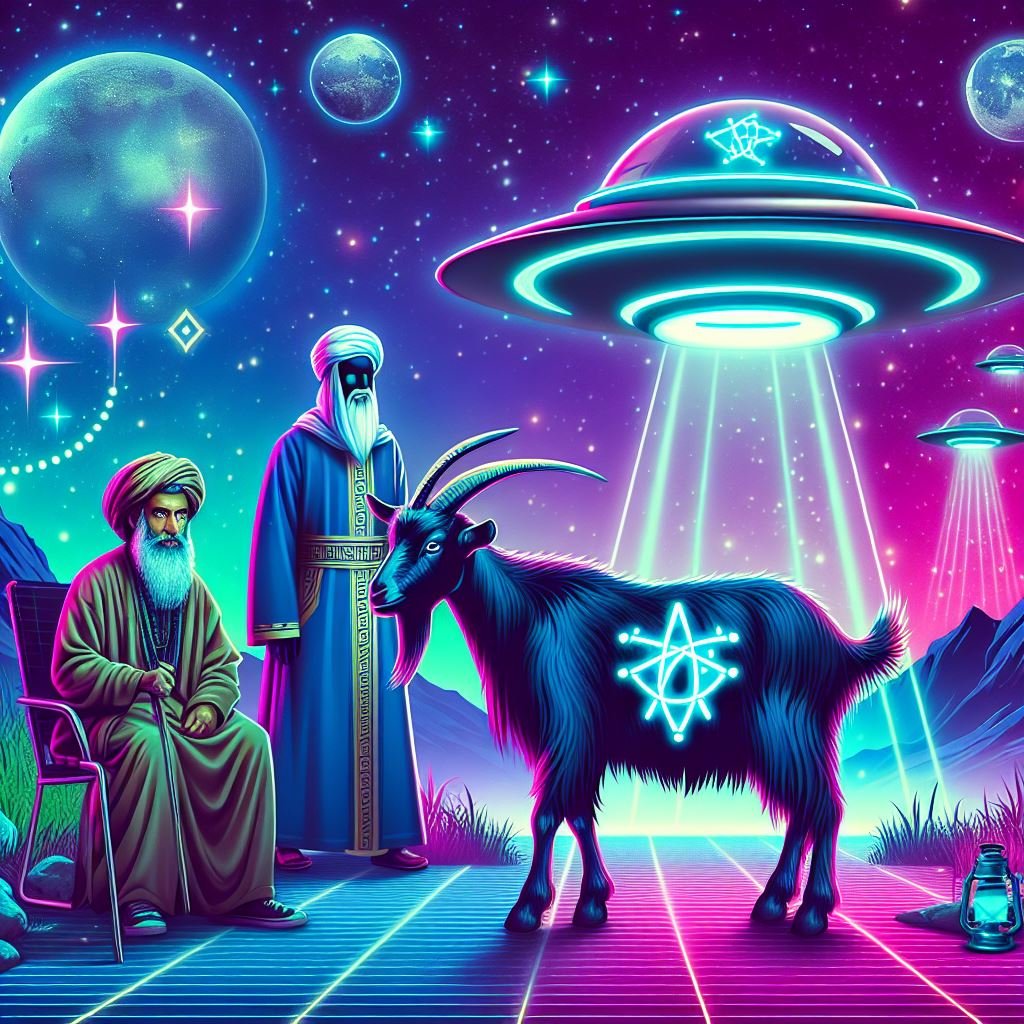
The Ressurection
A Story Retold
But now from his own hand till after the crucifixion…

Chapter 1 - The Temple
Jesus' narrative starts with his unconventional birth in a Bethlehem cave due to a census by Quirinius. He reflects on the celestial events surrounding his birth, hinting at his significance. In Nazareth, he recalls helping his family and learning from a local scholar, Nikandros.
During his first Passover in Jerusalem, Jesus is struck by the grandeur of the temple, which represents faith and community rituals. However, he grapples with profound questions about the temple's purpose, the nature of God, and the delay of the promised Messiah. Instead of clarity, he encounters contradictions in teachings, leading to frustration with faith and religious authorities.
As a child, Jesus struggles with his identity amid rumors about his lineage. He feels turmoil over his legitimacy and his relationship with his mother, who embodies traditional beliefs. Rather than conforming, he seeks a deeper understanding of truth and morality beyond religious norms.
Discontent with the shallow spirituality of Nazareth, Jesus seeks knowledge that challenges societal expectations. He contemplates his potential as a prophet, realizing that knowledge must be earned rather than passively accepted.
The narrative highlights the conflict between Jesus's aspirations and societal expectations. His mother's authority clashes with his quest for self-discovery, sparked by observations of inequality and the emptiness of temple spirituality. This growing awareness drives him to question conventional teachings and seek his own understanding of faith, justice, and identity.

Chapter 2 - John
In a narrative centered on Jesus, the protagonist grapples with the influential presence of John the Baptist, a charismatic figure claiming eternal life through baptism in water, resonating deeply with the agrarian community. Jesus embarks on a quest for knowledge, traveling to cultural hubs like Alexandria and Jerusalem, where he refines his understanding of sacred texts and spiritual teachings. As he struggles with his identity amidst John's rising popularity, he faces ridicule yet finds solace in supportive relationships. The climax occurs at the Jordan River, where a tense confrontation between Jesus and John solidifies their roles in the spiritual landscape. After this pivotal moment, John transitions from rival to ally, enhancing Jesus's stature and shaping his spiritual message. Their evolving dynamic underscores a shared journey toward meaning and fulfillment.

Chapter 3 - Desert
In a desolate desert, Jesus experiences profound hunger and isolation after three days without food, stirring memories of his vibrant community and his new wives who are expecting. This physical craving clashes with his spiritual journey, as he seeks divine connection through prayer. His hunger leads him to contemplate the essential role of food in shaping human experiences and the necessity of hope amidst despair. A mysterious figure, resembling a "white bloated mummy," appears, symbolizing potential spiritual revelation and contrasting his inner turmoil. As dawn breaks, Jesus reflects on the plight of his imprisoned friend John and the broader societal implications of hope amidst oppression. This journey encapsulates his quest for meaning, intertwining personal and collective struggles of body, spirit, and social justice.

Chapter 4 - Capernaum
In this reflective narrative, Jesus recounts his time in Galilee, where he greeted each dawn alone on a hilltop while contemplating the complexities of human nature. Despite the beauty of life around him, he felt the weight of people's ignorance and cruelty, often worried that they would seek to harm him in the name of righteousness. He muses on the nature of betrayal and questions the validity of laws that sanction harm, suggesting that divine madness resides within crowds seeking truth. Living in a widow’s lavish home, he freely granted liberty to his Gaulish slaves, who chose to stay despite their freedom. Jesus delivered prophecies in synagogues and attracted diverse groups, including outcasts and criminals, who spread his message. This blend of solitude, companionship, and the heavy burden of expectation shaped his existence as he navigated love, sacrifice, and the search for meaning amid chaos.

Chapter 5 - Blood
In the Galilean town of Cana, I was approached by locals to attend a wedding feast for the son of the local judge. Despite my disciples' objections, I decided to go, taking Judas with me while the others searched for ways to make a living. I have never been fond of weddings, viewing them as absurd celebrations that waste resources on entertaining guests instead of focusing on the couple's fate. At the feast, I was seated at a table filled with food, but I refrained from indulging, feeling the atmosphere of the house was gloomy and unfriendly despite the candles and lamps. Over time, I developed a sense for the nature of a place, which often felt independent of its owners. The speeches at the feast were filled with empty piety, adding to the air of discomfort I sensed in the gathering.

Chapter 6 - The Letter
In an olive grove near Cana, Jesus and his disciples enjoyed a lively lunch, away from the sick seeking his help. Among them was Matthew, a contemplative scribe, who documented their experiences on various scraps of parchment. While Matthew’s notes diverged from reality, he skillfully gained people’s trust, often receiving letters to pass on to others. During their meal, a Roman commander named Marcus Sextus approached, seeking Jesus's aid for his ailing seven-year-old son, who suffered from seizures and conveyed desires to shed his skin and be "born again." Despite his son’s strange visions, Jesus recognized the boy's condition was hereditary rather than fatal, reflecting the intensity of Marcus's emotions and desperation. This encounter foreshadowed a crucial moment of compassion and healing, emphasizing hope in the face of suffering.

Chapter 7 - Jerusalem
In Jerusalem, a city vibrant yet dark, a group of disciples led by a narrator arrives on the eve of Passover, leaving their lives in Galilee behind. Nostalgia for his late stepfather, Joseph, lingers, but feelings for his mother remain absent. They find lodging with an old man Simon knows, whom they promise to help with his gout. The city buzzes with unrest as zealots are executed for resisting Roman authority. The narrator feels a powerful connection to Jerusalem, envisioning himself as a prophetic messenger. He longs for a new way to honor God through joy rather than sacrifice, yet senses the city's indifference to him. Undeterred, he decides to engage with Jerusalem, gathering his disciples to the Temple for a different purpose than mere prayer, despite Matthew’s fears of repercussions. The tension between hope and reality underscores their journey through this complex city.

Chapter 8 - Shamai
In Chapter 8, titled "Shamai," Jesus describes a hurried journey to Galilee, seeking to escape Jerusalem. They stop in an olive grove near Chaza-EL, where Jesus encounters Shammai, an esteemed lawgiver known for his strict adherence to the Law. The weary Shammai expresses his deep concern about the preservation of faith amidst changing times, warning that if faith is altered, it may wither away. Jesus reflects on the irony of Shammai's worries for the kingdom's future, given his frailty, and maintains a sense of reverence while also challenging Shammai. He asks if the old man could rise and teach the entire Law while standing on one leg, symbolizing a desire for a more accessible understanding of spirituality. This interaction illustrates the tension between rigid tradition and the evolving nature of faith.

Chapter 9 - Zajin
In Chapter 9 - Zajin, Jesus dreams of a Temple of money that yields prosperity for those who invest, with each deposit representing a brick in a speculative structure. As wealth flows in, Jesus and his disciples enjoy success; Andrew buys a house, Simon gains a senatorial seat, Matthew opens a scriptorium in Jerusalem, and Judas studies astronomy. Jesus, celebrated as a poet writing in Latin, is confronted by Caiaphas, the high priest, who accuses him of unjust enrichment and warns him to stop writing. Despite the threat and ominous signs, Jesus continues his work, reflecting a world in decline. He awakens to find his disciples beside him, highlighting a moment of vulnerability as he longs for water, symbolizing both a physical and spiritual thirst in the midst of his grand aspirations.

Chapter 11 - The Ship
In Chapter 11 - The Ship, revealed to Jesus who stands on the icy peak of Mount Hermon on a cold, starry night, surrounded by a vast expanse of water reflecting the stars above. Conflicted and alone, he contemplates the possibility of a flood, worrying about his disciples, particularly Judas. As he grapples with feelings of isolation and uncertainty, he observes the still waters and reflects on survival amid destruction. Suddenly, a yellow light appears on the horizon, growing into a massive illuminated ship, resembling Noah's Ark, which offers the promise of rescue. This great vessel symbolizes hope and life amid desolation, showcasing divine intervention amidst darkness and despair. As it approaches, Jesus feels both wonder and anticipation, realizing the ship embodies the possibility of salvation and a new beginning from the overwhelming cold and silence that surrounds him.

Chapter 10 - The Samaritan
In Chapter 10, Jesus reflects on the journey through Samaria, where he encounters Hebrews of mixed heritage, which his spiritual father condemns. Despite their struggles with hunger, he remembers the abundance from Capernaum and the challenges they face from patrols. Simon, a member of his group, goes out to ensure their safety and meets a distraught Samaritan woman, whose husband falsely accuses her of infidelity. Understanding her plight, Simon gives her a powerful remedy to incapacitate her husband. The woman successfully administers the concoction, rendering her husband unable to accuse her further. When they reunite in town, the Samaritan woman expresses her gratitude and calls Simon a great teacher, highlighting the compassionate interactions amid the trials they face. This chapter emphasizes themes of love, mercy, and the complexities of societal judgments.

Chapter 12 - Aurelius
In Chapter 12, Jesus wakes up in a barn, covered with a wool coat, and reflects on the bustling city of Capernaum where his students are presumably searching for an opportunity. He observes Aurelius, the Roman prefect, from a distance and considers the privilege and arrogance that define his authority. Their interaction reveals Aurelius's disdain for Jewish customs and his suspicion of Jesus as a potential criminal. Aurelius mentions concerns from the local synagogue rabbi about Jesus gathering crowds, which he finds laughable. He accuses Simon, one of Jesus's followers, of trying to steal a chicken, hinting at the consequences if Jesus continues to attract attention. As Simon limps up with a busted nose, Jesus contemplates the nature of theft and the complexity of salvation. The chapter captures the tension between imperial authority and the struggles of the local populace.

Chapter 13 - The Envoy
In Capernaum, my support dwindled, with only a few local women occasionally providing food. We continued to live in a barn by the lake, surrounded by dried fish that symbolized our own mortality. The prefect Aurelius, upset over soap sales, sought to burden us further with the repugnant work of soap-making, despite its stench. People came from various regions to seek my counsel, and I was cautious to avoid drawing attention from the government. One day, a young man named Amiminan arrived, claiming to be an envoy from King Abgar of Osroene. Initially, I suspected him to be a spy or an elaborate setup by Aurelius, but after speaking with him, I realized he was genuine. He had traveled to find me, bringing a letter and a gold signet ring—symbols of honor from the king, indicating a connection beyond my immediate circumstance.

Chapter 14 - About Goats
The passage reflects on the duality of life and death, illustrating how one can find happiness in the unseen realms, particularly through figures like Hekate and Melinoe. As Hellene moves with urgency, a goat escapes, symbolizing freedom. The text critiques the rabbis' views on divorce and the unmarried state, emphasizing that women bear deep emotional burdens, likened to "a match," "a trap," and "shackles." The narrative suggests that instead of forcing marriage and procreation, which the rabbis mandate, an alternative could be to increase the population of goats. This would allow men who choose not to marry to leave behind joyful, immortal progeny in a different form, witnessed through their footprints in the morning sand near a spring, rather than within traditional family structures. Ultimately, the passage highlights the complexities of relationships and societal expectations concerning marriage and family.

Chapter 15 - The Synagogue
In Chapter 15, the narrator visits the Capernaum synagogue, disregarding the disapproval of Rabbi Avdon. He admires the synagogue's beauty and explores scrolls containing Baruch's prophecies, which offer a critical lens on Jewish suffering. During a Sabbath discussion, Rabbi Avdon praises the Roman government, emphasizing obedience and the futility of rebellion, referencing the recent punishment of Lucius Aelius Seianus as justified. The narrator challenges Avdon’s stance, arguing against blind allegiance to power and calling for a reassessment of their faith and lineage. He invokes the prophet Isaiah's call to flee Babylon, emphasizing the urgency for action against oppression. Avdon retorts with threats of dire consequences for such rebellious thoughts, suggesting that those like the narrator meet grim fates. The tension highlights the struggle between passive submission to authority and the desire for spiritual and political freedom.

Chapter 16 - Quintus Lanius
Quintus, once a spoiled young man from a distinguished lineage, found himself exiled from Rome after a scandal with a consul's wife. He redirected his life during his travels, delving into foreign philosophies and religious teachings. Arriving in Capernaum from Bosra, he entered a synagogue out of curiosity. As we shared honey and warm goat milk, he inquired about my signet ring, a gift from Oroza Bakoerat. I lamented that the ring, while precious, was impractical if one was hungry and I wished the star diviner had given me gold coins instead. Quintus expressed disbelief that someone like me, associated with the king's chief, would prioritize material possessions over sustenance, revealing a burgeoning depth in his character after a year of exile that had sparked his intellectual curiosity.

Chapter 17 - The legionnaires
In Capernaum, I encountered a detachment of Roman legionnaires who, despite their imposing presence, were engaged in mundane tasks like city beautification and tending to their encampment's gardens. They often sought entertainment and companionship, largely due to the lack of local brothels. My attempts to discuss God and the vanity of earthly life were met with laughter and indifference. However, one afternoon, after sharing a pipe filled with gunpowder, the mood shifted. Suddenly, the legionnaires transformed, laughing and eager to ask questions about faith and existence. This unexpected response showed me that even amidst their rough exterior, they yearned for understanding and connection. They, like many others, sought something deeper in life, prompting me to realize that true communion with God goes beyond mere rituals; it lies in affirming His reality amidst the distractions of our earthly lives.

Chapter 18 - About Commerce
In Capernaum, as I sat in the shade, a legionnaire approached me, expressing joy from our previous conversation and requesting more kif, which I sold him. Realizing the potential for profit in reselling kif, I decided to visit Venedad in Gegreza to purchase more. Consulting with Judas and Philip, I hoped to create an income source by selling it in small quantities. Commerce intrigued me as it offered an escape from the burdens of hard labor, reflecting on the notion that fair trade could lead to world peace. Unlike piracy, trade demanded integrity and fostered prosperity. I believed having a good heart paired with wealth was preferable, emphasizing the importance of gratitude for a fulfilling life. In essence, this way of thinking aligned with the spirit of Mercury the Profitable, guiding us toward a life free from the struggles of relentless daily toil.

Chapter 19 - The Leper
As dawn broke over Gergesa, I encountered a leper named Ephraim, who approached me with a painful gait and a troubled past. Once wealthy, he had been shunned by his family due to his affliction. Despite his suffering, his belief in my ability to heal him was profound. He recounted unsuccessful attempts at cleansing through rituals, yet the torment of his illness remained. I placed my hand on his scalp, closed my eyes, and delved into his soul, realizing that parts of his identity had been stripped away by both illness and the harsh judgment of others, particularly from his mother-in-law, who called him "Ef." I extinguished the fire of his leprosy and instructed him to write his full name in the sand, symbolizing his reclamation. Ephraim found peace, humor, and strength within himself, grateful for the healing and new hope I offered him.

Chapter 20 - Gergesa
In Gergesa, Venedad welcomed us to his home, mistakenly believing we were in town for the winter. His house was lively, with a mix of domestic sounds and the presence of old women spinning. After sharing news about the death of a leper I had witnessed, Venedad invited us to his rooftop quarters, where we enjoyed a meal with a view of the lake. He candidly shared his health issues and frustrations about government restrictions on his trade, despite his complaints revealing his stingy nature. He boasted about his daughter and his plans to write a book about his life, detailing his experiences. As we feasted on a variety of dishes, I casually asked Venedad if he could supply kif, which surprised him. The meeting painted a vivid picture of his character, a mix of pride and vanity wrapped in his ongoing struggles.
